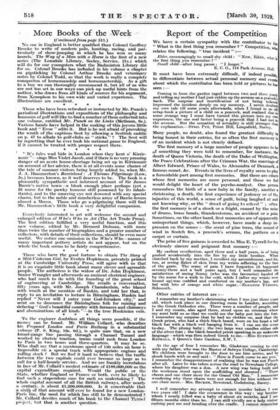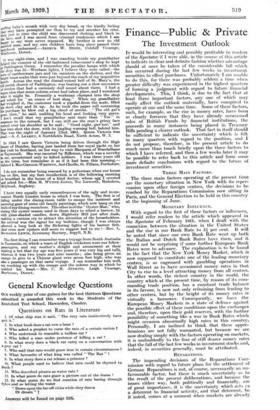Report of the Competition
WE have a certain sympathy with the contributor to the " What is the first thing you remember " Competition, whe relates the following, " true incident " :- Elder, encouragingly to small shy child : " Now, Edith, what h the first thing you remember ? " Small child—after long pause : " I forget."
E. C. G., 118 Park Avenue, Hull,
It must have been extremely difficult, if indeed possible, to differentiate between actual personal memory and events about which the contributor has been told or pictures he hay seen :- Coming in from the garden (aged between two. and three yeah) and telling my mother I had just ridden up the avenue on a peacock', beck. The surprise and mortification of not being believed impressed the incident deeply on my memory. I never doubted my own tale till some years afterwards, when I found in an old scrap-book a picture of a child on a peacock, and realized that in some strange way I must have turned this picture into my own experience, the one real factor being a peacock that I had met is the avenue. But the sensation of actuality is still stronger than the explanation.—SYmm PYE, Priest Hill, Limpsfield, Surrey.
Many people, no doubt, also found the greatest difficulty in being honest in their entries; for so often the first memory ii of an incident which is not clearly defined.
The first memory of a large number of people appears to be of something they were told to remember, for instance, the death of Queen Victoria, the death of the Duke of Wellington, the Peace Celebrations after the Crimean War, the marriage of Albert Edward, Prince of Wales, to Alexandra of Denmark, a famous comet, &c. Events in the lives of royalty seem to play a formidable part among first memories. But there are others whose first memories are more personal, and these we feel would delight the heart of the psycho-analyst. One person remembers the birth of a new baby in the family, another a christening, a death, the first experience of jealousy or of the injustice of this world, a sense of guilt, being laughed at and not knowing why, or the " dread of going to school " ; often the first memory is of a shock or a fright, caused by the noise of drums, brass bands, thunderstorms, an accident or a pain. Sometimes, on the other hand, first memories are of apparently unimportant things, which, however, have made a deep in. pression on the senses :—the scent of pine trees, the sound of wind in Scotch firs, a pea cock's scream, the pattern on a carpet or curtain.
The prize of five guineas is awarded to Miss E. Tyrrell for her obviously sincere and poignant first memory :— My earliest recollection, aged three and a half years, is of being pushed accidentally into the fire by my little brother. When clutched back by my mother, I recollect my astonishment, and his, too, at seeing flakes of skin from my wrists adhering to the bars of the grate. The sense of pain I have forgotten (it happened seventy-three and a half years ago), but I well remember the satisfaction of seeing Sonny (who was the favourite) hauled oft by the nurse for a walk in the cold, while I (after my wrists were bound up) was cuddled and comforted on my mother's lap, and fed with bits of orange and white sugar.—ELEANOR TYRRELL, Sidmouth.
Other entries of interest are :-
I remember any brother's christening when I was just three years old, which took place in our drawing room in London, according to the Greek Orthodox rite. There were a number of people, and I and my cousin, also aged three, stood upon an ottoman where my aunt held us so that we could see the baby put into the font. I remember my surprise that he had no clothes on, and that the Greek priest, who had a thick black beard, wore on his head a tall black hat with a black veil hanging from it. I can see the scene to-day. The plump baby ; the two large wax candles either side of the silver font ; the black-bearded priest speaking in an unknown language—which was then indeed Greek to me.--Mis3 EUPHOSYNE lisesstA, 5 Queen's Gate Gardens, S.W. 7.
At the age of four I remember Mr. Gladstone coming to stay with my father, who was the Master of Selwyn College, Cambridge. We children were brought to the door to see him arrive, and he shook hands with us and said : " Here is Punch come to see you. I remember the disappointment of realizing that he was not Punch after all. Later he was taken across the road to Newnham College, where his daughter was a don. A new wing was being built and the workmen stood upon the scaffolding and shouted : " Three cheers and one cheer more for the Grand Old Man." I remember wondering why three chairs were not enough for him without the one chair more.--Mrs. BECKER, Newstead, Godalming, Surrey.
I well remember my attempt to commit murder before I was two years old ! I date the occurrence in this way : my brother whom I nearly killed was a baby of about six months, and I am fifteen months older than he. I can still vividly see a lady visitor rushing past me and bending over the cradle. I cannot remember
g baby's mouth with very dry bread, or the kindly feeling way have prompted me thus to try and smother his cries. y just in time the child was discovered choking and black in face, and I was saved from criminal tendencies which I am to say were never repeated. My brother is now an old man, and my own children have long since passed their ood unharmed.—Aarutut W. STOTE, Colehifl Vicarage, uoborne, Dorset.
it was night-time, and I was standing beside my grandfather • d the counter of the old-fashioned tobacconist's shop he kept paddington Green. I remember the peculiar lamps with which the shop was lit—Wenham lights, I believe they were called—the ws of earthenware jars and tin canisters on the shelves, and the t brass scales that were just beyond the reach of my inquisitive hods. Across the road the dismal-voiced bell of St. Mary's, the ohi parish church of Paddington, was beating out a slow succession of strokes that had a curiously dull sound about them. I had a vague idea that some solemn event had taken place, and I wondered what it might be. Presently a workman clumped into the shop and asked for " an ounce of best shag." When my grandfather had weighed it, the customer took a pipeful:from the scale, filled
his short clay and lit up. As he took the paper roll containing his purchase he blew out a big cloud of smoke. " The old gal's
gone, then," he said, nodding his head and looking very grave. I don't recall that my grandfather said more than " Yes " in
response to the remark, but I can still see the man's grimy face turned over his shoulder as he said : " Good night, guy nor," and her him shut the door, with its jingling warning bell, behind him. That was the night of January 22nd, 1901. Queen Victoria was
dead.—A. J. LEAKEY, 6 Northfields Road, North Acton, W. 3.
In 1844 I saw Queen Victoria being driven through the High Street of Dundee, having just landed from her royal yacht on her first visit to Scotland, on her way to visit Marquess of Braedalbane at Taymouth. She was escorted by Riflemen, which was a novelty to me, accustomed only to kilted soldiers. I was three years old at the time, but remember it as if it had been this morning.— Colonel I. MAcGazeou-WurrroN, Ard Choille, St. Fillans, Perthshire.
I do not remember being rescued by a policeman when our house Vas on fire, but my first recollection is of the following morning at breakfast in the house of a kind doctor, whose egg I coveted and asked for.—Miss M. WYNNE-JONES, Tre Iorwerth, Bodedern, Holyhead, Anglesey.
I have two equally early remembrances of the ugly and incon- venient North London house in which I was born. The first is of hiding under the dining-room table to escape the insistent and pursuing gaze of some old family paintings, which now hang on the walls of my dining-room here. The other is of the " Oyster-Man," who, during the oyster season used in those days to wheel a barrow, lit with glass-shaded candles, down Highbury Hill just after dusk, making a curious cry to attract the attention of the householders. His arrival was the signal for my bedtime, though I was always allowed a long look at the flickering lights of his barrow first. And even now oysters still seem to suggest bed to me !—Rev. L. RICHARDS Lewis, Inveraray Rectory, Argyll, N.B.
The first thing I can remember was a voyage from South Australia to Tasmania, on which a team of English cricketers were our fellow- passengers, and my mother's delight and amusement at their making a bet that my age was five years (I was very big and tall), whereas it was two years and nine months ; also being given an orange to give to a Chinese giant over seven feet high, who was also a passenger on that same voyage. I can remember him well, my reaching up with the orange and the solemn way in which he nodded his head.—Mrs. C. M. JENKINS, Leigh Vicarage, Sherborne, Dorset.



















































 Previous page
Previous page